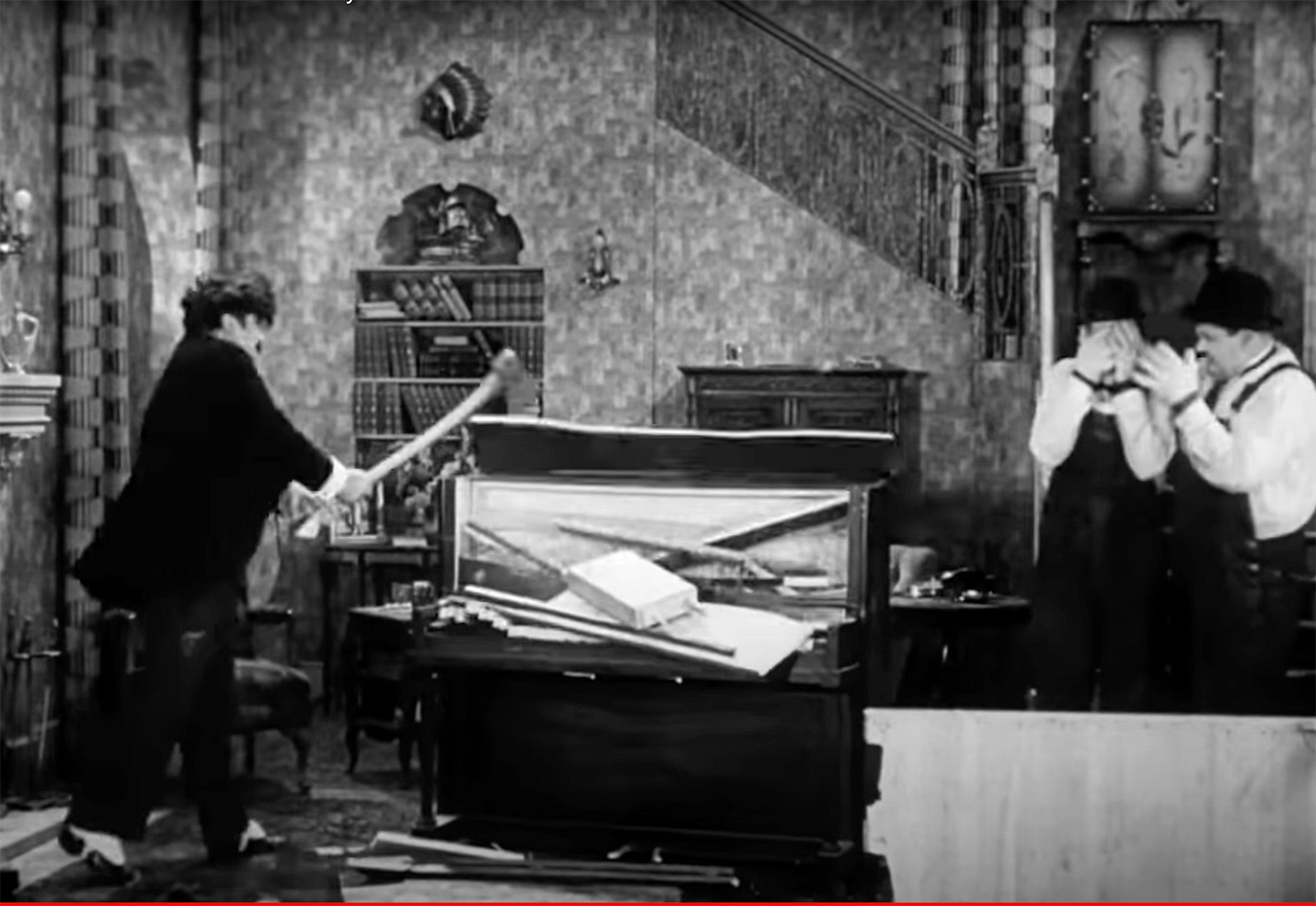"Crush!"
Ad for iPad Pro gets flattened. Apple apologizes. The backlash spawns a backlash. What have we learned?

The hubbub about the ad has died down. The products went on sale this week and the reviews have been fine. Reports from Apple Stores say lots of folks are showing up to check them out.
But in the first days following last week’s intro event, it felt like outrage over the ad might overshadow the product. Slammed as “the destruction of the human experience” (Hugh Grant) and lamented as a “heartbreaking, uncomfortable, and egotistic advertisement” by a customer, who went on to add that he was ashamed for buying Apple products over the past nineteen years (Hiroki Akiyama), the ad was withdrawn after a quick apology. “We missed the mark with this video, and we’re sorry.”
I wonder if anyone in Cupertino had even a glimmer of expectation that “Crush!” would get squashed like a fuckin’ grapefruit in the vise of public opinion.
In case you haven’t seen it, here is what sparked the outrage:
My guess is that Apple anticipated none of the backlash. I can’t be sure, of course, but I’d wager that Apple saw “Crush!” simply as an extravagant way to say “new and improved.” The visual metaphor of the ad was a collection of physical tools and instruments—corresponding to various gaming and creative apps—all being compressed into a thin rectangle. Ta-dah! The new iPod Pro. In the process we were treated to some thirty-five seconds and twenty-eight cuts of squishing, splashing, and scrunching. It was all sealed off with a simple voiceover: The most powerful iPad ever is also the thinnest.
Surely it wasn’t meant as a anything more than a bit of sizzle before the presenters delivered the steak—their usual litany of technical specs—dimensions, weight, display, processor, storage, RAM, accessories, pricing, and availability .
Turns out, however, that for many viewers all that crunching compression amounted to a horror show.
The backlash was a classic illustration of principles described by communications guru Tony Schwartz in The Responsive Chord. Schwartz argued that communications work through resonance. An ad isn’t an information dump. It’s an emotional trigger. Schwartz’s most famous ad—”Daisy” created for the Lyndon Johnson campaign against Barry Goldwater in 1964 is, perhaps, the supreme example of this. Without once mentioning Goldwater, the ad managed to evoke, reinforce, and focus negative impressions that people already harbored.
A great disturbance in the force.
I’ve been pondering what caused such a brutal backlash. There’s more to it than simply a negative reaction to the destruction of musical instruments. After all, demolition has been a staple of entertainment for longer than I’ve been alive.
Billy Gilbert takes an ax to a piano in the very first comedy short to win an Oscar—Laurel and Hardy’s “The Music Box” (1932).

Fast-forward to the 1960s: Peter Townsend and Jimi Hendrix make smashing guitars a signature part of their acts.
Fast-forward to the 1980s: David Letterman entertains his audience with a running gag where he giddily crushes things with hydraulic presses, steamrollers, and even a train.
Fast-forward to now: TikTok hosts a whole genre of #willitcrush videos subjecting all sorts of objects not only to hydraulic presses and trash compactors, but also to lobster claws, mortar and pestle, and even the motorized lid of the “frunk” (front luggage compartment) of a Cybertruck.

Nevertheless, when Apple squashed a collection of cameras, games, books, and musical instruments, people recoiled with the exquisite empathy of Obi Wan Kenobi sensing the destruction of Alderaan.
“I felt a great disturbance in the Force... as if millions of voices suddenly cried out in terror, and were suddenly silenced. I fear something terrible has happened.”
It’s worth recalling that Alec Guinness told an interviewer that he thought he overacted in that scene. Reeling backward and clutching his forehead amounted to, in his opinion, “an unpardonable cliché.”
For some people, the backlash against “Crush!” is likewise an overreaction. Keith Teare has collected some of the counter-backlash in his newsletter.
But you can’t argue people out of an emotional response. It is what it is. The ad works or it doesn’t. And for many it didn’t. I think I know why.
It wasn’t so much the items that were crushed as it was the relentless machine that bore down on them. It’s one thing when Jimi Hendrix gleefully lights his guitar on fire. It’s something else entirely when a soulless gray metal device squeezes down on a guitar with a steady, inexorable force.
We’ve had a painful ambivalence about replacing human craft with machines since the beginning of industrialization. In the march progress, we’re always balancing what’s lost against what’s gained. That dread has notched up with emergence of robotics, the disruptions of AI, and the consolidation of dominance into tiny number of tech giants, one of the largest of which is Apple.
Reinforcing the anxiety of over loss was the sound-track. What we heard behind all the crunching sounds was a deftly edited version of Sonny & Cher singing “All I Ever Need is You.” The love-song specific lyrics were all cut and what we’re left with is this;
Sometimes when I'm down and all alone
Aw all I ever need is you
Winters come and they go
And we watch the melting snow
Sure as summer follows spring
All the things you do
Give me a reason to build my world around you
Some men follow rainbows I am told
All I ever need is you
by Edward Benton Reeves / Jimmy Holiday
All I Ever Need Is You lyrics © Sony/ATV Music Publishing LLC, Warner Chappell Music, IncNotably missing is the sweet twist of reciprocity at the end:
Through ups and downs of every single day I won't sleep at night until you say, my honey All I ever need is you
If you’re a creative professional, you can now forget all your analog tools and instruments. All you need is iPad Pro. Build your world around it.
Macintosh was presented to the world in an ad where a colorful hammer-thrower smashed a screen showing a gray oppressive authority figure. iPad Pro was presented in an ad where a giant gray metal press squeezes all the color and joy out of the world.
Oops.





Great piece, Michael. Never saw this ad—now I don’t want to!
Could it be that Apple has turned from a likeable underdog fighting for individuals to the gray unfeeling overlord despised by all?